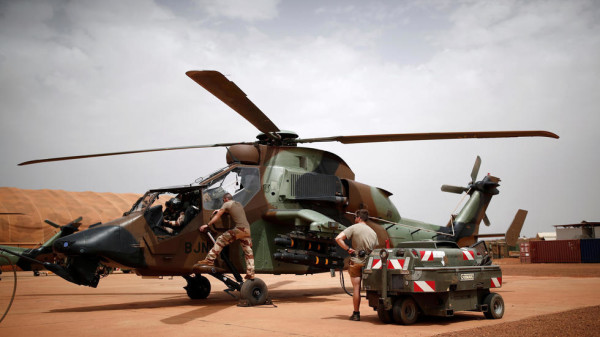

PARIS/BAMAKO (Reuters) – Thirteen French soldiers were killed in Mali when their helicopters collided at low altitude as they swooped in at nightfall to support ground forces engaged in combat with Islamist militants.
It was the biggest loss of French troops in a single day since an attack in Beirut 36 years ago when 58 soldiers died.
The ground commandos had been tracking a band of militants moving on pick-up trucks and motor-bikes. After identifying the group on Monday, the Tiger and Cougar helicopters were sent to reinforce, along with a combat jet.
French President Emmanuel Macron expressed his “deep sadness” at the loss.
“The President of the Republic salutes with the greatest respect the memory of these soldiers,” the Elysee Palace said in a statement. “He bows to the grief of their families and their loved ones.”
France, the former colonial power in the region, first intervened in Mali in 2013 to drive out militants who had occupied the north. It still has a 4,500-strong Barkhane force countering insurgencies in the wider region.
Rather than stabilizing, security has progressively worsened.
Islamist militants with links to al Qaeda and Islamic State have strengthened their foothold across the arid region, making large swathes of territory ungovernable and stoking ethnic violence, especially in Mali and Burkina Faso.
Two years ago, four U.S. special forces died in a firefight with militants in Niger, an incident which shone a light on Washington’s special forces-led counter-terrorism activity in the West African Sahel, which lies just below the Sahara desert.
Lawmakers in France’s National Assembly will hold a minute’s silence later on Tuesday.
In a message of condolence to Macron, Malian President Ibrahim Boubacar Keita said the French soldiers “died for Mali, they died for the Sahel, they died for freedom.”
France bears brunt
The collision occurred at 19h40 local time, when darkness would have fallen over the area, as the helicopters maneuvered ahead of engaging with the militants, the army said.
The Tiger attack-helicopter and multipurpose Cougar hit the ground a short distance apart. There were no survivors.
Monday’s deaths bring the total number of French soldiers killed in the Sahel region since 2013 to at least 38, officials said.
More than 200 soldiers from regional nations and international peacekeepers have been killed since September in Mali alone, with dozens more killed in Burkina Faso.
France’s hardleft La France Insoumise (France Unbowed) party, which has only a small representation in parliament, said it was time work out an exit from the Sahel region.
“We’re have the impression there is no strategy, no exit plan,” Bastien Lachaud, a France Insoumise lawmaker who sits in parliament’s defense committee told Reuters. “The government must say when France will leave Mali.”
France maintains troops in the Sahel as part of Barkhane counter-terrorism operations, while some European countries and the United States have provided logistical support, trainers and some special forces.
A separate regional force, the G5 Sahel, made up of soldiers from Mali, Niger, Burkina Faso, Chad and Mauritania, remains perennially underfunded and hobbled by poor coordination three years after its launch.
That has left much of the onus on France. Paris is frustrated that it is taking the brunt of ground operations but dismisses the suggestions of some opponents it is stuck in a pointless fight.
Armed Forces Minister Florence Parly told a parliamentary hearing on Nov. 20 that the French mission was not stuck in the region, but urged European partners to do more to support it.
“Europe is not immune to these security concerns, because if the Islamic State and al Qaeda branches were to establish themselves in a sustainable way in the Sahel, this would pose a security problem for Europe as a whole,” she said.
“I do not think we are bogged down.”